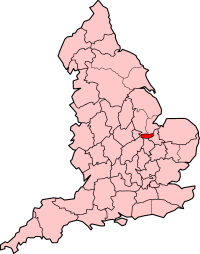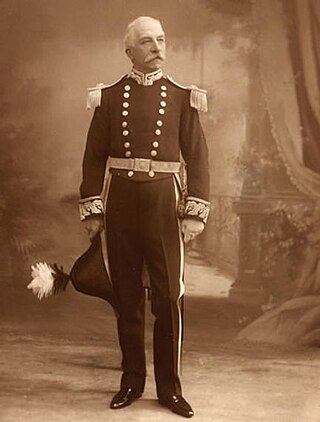
A lord-lieutenant is the British monarch's personal representative in each lieutenancy area of the United Kingdom. Historically, each lieutenant was responsible for organising the county's militia. In 1871, the lieutenant's responsibility over the local militia was removed. However, it was not until 1921 that they formally lost the right to call upon able-bodied men to fight when needed.

The governor of Oklahoma is the head of government of the U.S. state of Oklahoma. Under the Oklahoma Constitution, the governor serves as the head of the Oklahoma executive branch, of the government of Oklahoma. The governor is the ex officio commander-in-chief of the Oklahoma National Guard when not called into federal use. Despite being an executive branch official, the governor also holds legislative and judicial powers. The governor's responsibilities include making yearly "State of the State" addresses to the Oklahoma Legislature, submitting the annual state budget, ensuring that state laws are enforced, and that the peace is preserved. The governor's term is four years in length.

A justice of the peace (JP) is a judicial officer of a lower court, elected or appointed by means of a commission to keep the peace. In past centuries the term commissioner of the peace was often used with the same meaning. Depending on the jurisdiction, such justices dispense summary justice or merely deal with local administrative applications in common law jurisdictions. Justices of the peace are appointed or elected from the citizens of the jurisdiction in which they serve, and are usually not required to have any formal legal education in order to qualify for the office. Some jurisdictions have varying forms of training for JPs.

The Soke of Peterborough was a historic area of England associated with the City and Diocese of Peterborough. It was part of Northamptonshire, but was administered by its own county council, while the rest of Northamptonshire was administered by Northamptonshire County Council. The Soke was also described as the Liberty of Peterborough, or as the Nassaburgh hundred, and comprised, besides Peterborough, about thirty parishes. The Soke was abolished in 1965.

The governor-general of Jamaica is the representative of the Jamaican monarch, currently King Charles III, in Jamaica. The governor-general is appointed by the monarch on the recommendation of the prime minister of Jamaica. The functions of the governor-general include appointing ministers, judges, and ambassadors; giving royal assent to legislation passed by parliament; issuing writs for election.

The courts of quarter sessions or quarter sessions were local courts that were traditionally held at four set times each year in the Kingdom of England from 1388; they were extended to Wales following the Laws in Wales Act 1535. Scotland established quarter sessions in the 17th century. Quarter sessions were also established in Ireland and British colonies overseas.

In the United Kingdom, a deputy lieutenant is a Crown appointment and one of several deputies to the lord-lieutenant of a lieutenancy area – an English ceremonial county, Welsh preserved county, Scottish lieutenancy area, or Northern Irish county borough or county. Before the creation of the Irish Free State, all Irish counties had deputy lieutenants.
A high sheriff is a ceremonial officer for each shrieval county of England and Wales and Northern Ireland or the chief sheriff of a number of paid sheriffs in U.S. states who outranks and commands the others in their court-related functions. In Canada, the High Sheriff provides administrative services to the supreme and provincial courts.
The Lord Lieutenant is the monarch's representative in the English county of Dorset.
The Office of the Lord Lieutenant was created during the reign of Henry VIII (1509–1547), taking over the military duties of the Sheriffs and control of the military forces of the Crown. From 1569 there was provision for the appointment of Deputy Lieutenants, and in 1662 the Lord-Lieutenant was given entire control of the militia. The Regulation of the Forces Act 1871 transferred this function back to the Crown, and in 1921, the office lost its power to call upon men of the county to fight in case of need. Since 1711 all the Lord Lieutenants have also been Custos Rotulorum of Devon.
The Custos rotulorum, Latin for "keeper of the rolls" within civil government, is the keeper of the English, Welsh and Northern Irish county records. The Custos is also the principal Justice of the Peace of the county and keeper of the records of the sessions of the local courts and, by virtue of those offices, the highest civil official in the county. The position is now largely ceremonial and generally undertaken by the Lord Lieutenant of the county.
This is a list of people who have served as Custos Rotulorum of Lincolnshire.
A clerk of the peace held an office in England and Wales whose responsibility was the records of the quarter sessions and the framing of presentments and indictments. They had legal training, so that they could advise justices of the peace.
Custos rotulorum is the keeper of a county's records and, by virtue of that office, the highest civil officer in the county.

Richard Vaughan, 2nd Earl of Carbery KB, PC, styled The Honourable from 1621 to 1628 and then Lord Vaughan until 1634, was a Welsh soldier, peer and politician.

The judiciary of Jamaica is based on the judiciary of the United Kingdom. The courts are organized at four levels, with additional provision for appeal to the Judicial Committee of the Privy Council in London. The Court of Appeal is the highest appellate court. The Supreme Court has unlimited jurisdiction in all cases, and sits as the Circuit Court to try criminal cases. The Parish Court in each parish hears both criminal and civil cases, excluding grave offences. The Petty Sessions are held under Justices of the Peace, with power to hear minor crimes.
The custos rotulorum of County Durham was formerly appointed by the Bishop of Durham until the abolition of his palatine rights following the Palatinate of Durham Act, 1836. After that date the office of custos rotulorum was passed to the Lord Lieutenant of Durham.
Custos rotulorum is the keeper of a county's records and, by virtue of that office, the highest civil officer in the county.
The justice of the peace was a court official that existed at the county or district level in from the colonial period of the Province of North Carolina until 1968 in the U.S. State of North Carolina. Originally, the Justices of the Peace had authority over the Magistrates Courts, which covered petty criminal offenses and some civil matters. They were appointed by the Governor of the Province. In 1741, they were given the authority to solemnize marriages in counties that did not have ministers or with the consent of the local minister. After North Carolina became a State, they continued authority over Magistrates Courts at the county level, as well as solemnizing of marriages. They were commissioned by Governor of North Carolina upon recommendation of the North Carolina General Assembly. After the U.S. Civil War, they were authorized to register slave marriages that took place before the war. The number of Justices of the Peace in North Carolina continued to grow until the 1950s. The lack of uniform jurisdictions, rules and appointment procedures across North Carolina counties led to major changes in the North Carolina judicial system in 1968 that abolished the Justices of the Peace and placed some of their responsibilities with Magistrates.

Robert James deRoux, CD,. was a Jamaican businessman and the longest-serving Custos in Jamaican history. He served as Custos Rotulorum of Clarendon for 30 years.









